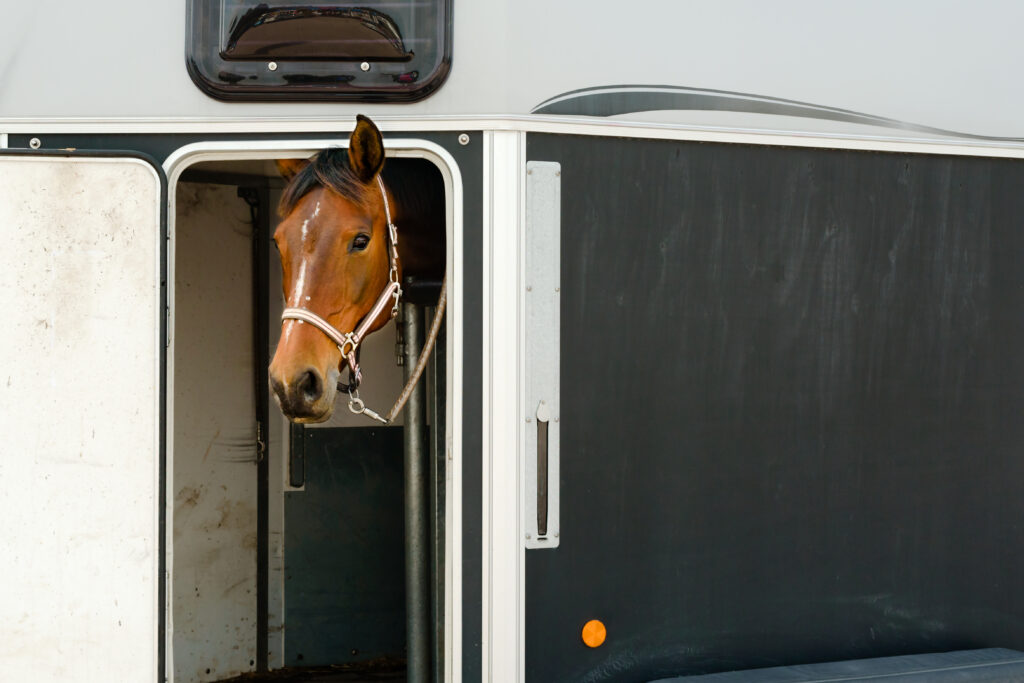
Sitting behind the wheel of a truck hauling your most important cargo can be nerve-wracking when you’re new to pulling a trailer. From finding the right truck-and-trailer combination to learning basic maintenance, there’s a lot to understand before you even leave the driveway. Here are a few things I’ve learned over the years that can help you haul safely and confidently.
1. Learn from an Experienced Mentor
Many new horse owners haven’t grown up pulling trailers or handling heavy rigs—and that lack of experience can make things risky on the road.
If you’re new to hauling, ride with someone who does have experience, whether it’s a commercial driver or a barn friend who’s been hauling for years. Hop in, ride around, and let them share what they’ve learned—what to do and what not to do. That’s the best way to ease into hauling.
Even short, low-pressure trips to lessons or clinics can help you gain confidence behind the wheel before you hit the highway with your horses.
2. Make Sure You Have the Right Truck for the Job
One of the biggest challenges I see is folks trying to tow trailers with vehicles that aren’t adequately equipped to carry the load. It happens all the time.
People tend to look at the big towing-capacity number in a brochure and think they’re fine, but it’s the smaller numbers in the fine print—the payload and tongue weight—that really matter. Vehicle manufacturers make those details confusing, and if you overlook them, it can put you and your horses at risk.
My golden rule: spec out your trailer needs first before buying a tow vehicle. You’d be surprised how many people tell me, “I just bought a brand-new SUV,” only to find out it won’t safely pull the trailer they need. The purpose of a tow vehicle is to tow—so make sure it’s built to do the job.
3. Choose the Right Trailer for Your Horses and Your Lifestyle
The first step in purchasing a trailer is to identify what your needs are. Are you hauling one or two horses locally, or will you be hauling long distances and staying overnight?
If you’re hauling two horses or fewer, a bumper pull might make sense. But if you’re hauling three or more horses, or you need room to camp or carry extra gear, a gooseneck trailer is the safer, more stable option. The way it’s affixed to the truck bed distributes the weight better and makes the rig easier to handle.
When choosing a trailer, pay close attention to the layout and accessibility—not just for your horse, but for you. I’ve seen plenty of beautifully built trailers that aren’t safe to move around in. If you have to squeeze between a divider and a 1,200-pound horse, that’s not a good place to be. Always think about where you’ll go if a horse spooks or refuses to load.
4. Keep Up with Maintenance
Even the best-built trailer becomes unsafe if it’s not maintained. I recommend getting an annual inspection, especially as the trailer ages.
If you have a living-quarters trailer, take it to an RV repair facility. RV and horse-trailer interiors are basically identical, and RV techs know what to look for. For standard trailers, any reputable trailer repair shop can inspect the wheels, bearings, axles, wiring, and welds. Staying on top of issues before they become problems can save you a lot of headaches down the road.
One of the most overlooked safety items is flooring. If you’re hauling every week, pull the mats once a month, hose them off, and let everything dry. If your trailer has an aluminum floor, do it after every haul. Horse urine and aluminum don’t mix, it can corrode the metal quickly. Regular cleaning can prevent one of the most horrifying (and preventable) trailer accidents: a horse falling through a weakened floor.
5. Always Double-Check Before You Hit the Road
A surprising number of trailer accidents come down to simple human error. I once had a client whose trailer came off the ball and hit the dirt as she was leaving her driveway. Nothing was wrong with her coupler or hitch—it just wasn’t latched.
If you latch it properly, it won’t come off. So, pay attention to every latch, chain, and connection before you pull out.
You’ve never had a problem—until you’ve had a problem. Once something happens, you’ll wish you’d done it differently. Take a few extra minutes to double-check your setup. It’s the simplest way to keep both you and your horses safe every time you haul.
Meet Brad Heath
Brad Heath is the founder of Double D Trailers and creator of the patented SafeTack Reverse design. With more than 25 years in the trailer industry, he’s dedicated to improving horse and handler safety through innovation and education. Learn more at www.doubledtrailers.com.

